
Last week, Nick Taylor wrote a beautiful piece about the early days of Viola Davis' screen career, specifically her tryptic of stellar supporting performances in 2002. The article highlights the actress's formidable talent for creating full characterizations with minimal screen time, how she conjures rich humanity from people on the margins of the story, imbuing every glance and spoken word with mountains of meaning. After reading that, I felt compelled to revisit some of the actress's best works and, here we are, exploring the only time Viola Davis was legitimately in contention for an Oscar nomination and missed. Coincidently, it's also my favorite performance of hers in what is probably the best film she's ever been in - Widows…
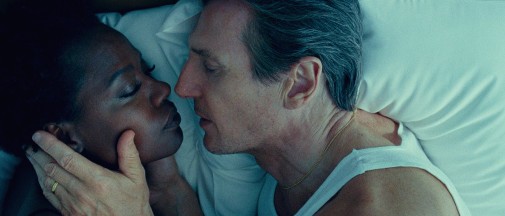
Adapted from a Lynda La Plante novel, Steve McQueen's Widows (2018) tells the story of four women in contemporary Chicago whose criminal husbands die in a heist gone wrong. The night of the tragedy opens the movie, intercut with glimpses into these women's lives before everything went to hell. This approach, where memories of the past force their way into present action is a mechanism McQueen returns to many times. Little flashes of intimacy suggest years’ worth of backstory. Widows is a movie where information is mostly transmitted through tonal juxtapositions and silent reactions with little exposition to go around.
It's a filmmaking approach that perfectly fits Davis' aforementioned capability of making complex characters out of little parts. Not that the character of Veronica Rawlings is a small part. Despite Widows being an ensemble piece, McQueen puts Davis front and center, relying on her to anchor a byzantine story of betrayals intertwined with lies. At the start, she's especially important for establishing tone with Veronica being a monument of grief. She's a pillar of strength, but she's also barely holding it together. In a spectacular mirror close-up, the director lets the actress dominate the screen, documenting how this mourner hides searing pain behind a mask of inexpression.

Such tensions between the façade of normality and the volcanic despair going on inside Veronica's heart contribute to a sense of unease that fully metastasizes when the widow is confronted by an unexpected visitor in her apartment. It seems that the criminals with which her husband worked have come to collect his debts, forcing her to act quickly or risk losing everything, her life included. Davis plays the moment perfectly, shrinking into herself when faced with an aggressor, allowing Veronica to be strong but not invulnerable. She's deadly afraid. The heist plot that follows is born out of that panic and it isn't any sort of masterplan executed with cold efficiency. Instead, it's performed with despair and resigned pragmatism by the actress and her fellow cast members.
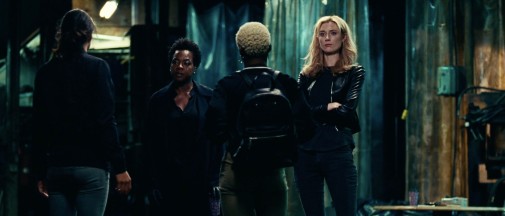
Davis is great throughout Widows' first acts, negotiating grief and helplessness, delineating precarious dynamics with her co-conspirators, and playing the part of an unexperienced bourgeois turned to crime. She even finds space for some humor, like when playing with her adorable dog or in a lovely bit of intimidation inside a sauna. Still, it's when Veronica's world gets turned upside down once again that Viola Davis' performance reveals its true genius. [SPOILERS!] As it happens, her husband didn't die and is behind a complex scheme that ended with his colleagues' deaths and the abandonment of Veronica. She discovers this most rudely, finding traces of his presence at his mistress' house, a blow that hits her like a sledgehammer to the solar plexus.
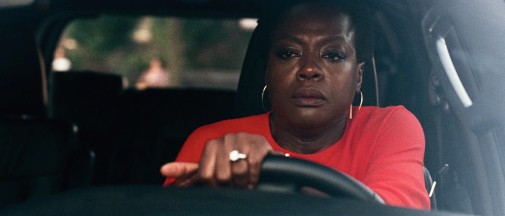
A lot of actors would play this pivotal scene by illustrating the conflicting feelings of Veronica, their faces made kaleidoscopes of expression. Davis, however, shuts down. She swallows her emotions, her face tenses and the neck flexes. She tries to show nothing, denying the camera and the audience the privilege of seeing her vulnerability. This lack of transparency is abrasive for the viewer but speaks to the idiosyncratic nature of this woman who has learned how to compartmentalize suffering. This is especially evident later on, when one more memory stabs their way into the present, letting us see another death in Veronica's past, that of her son. The look on Davis' face when opening the door to his empty bedroom, a cancer of loss in the domestic space, defies my descriptive prowess. It's beyond heartbreaking.
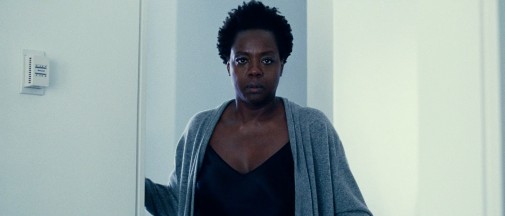
Not that there's a lot of time to consider the void in the heart of a mother who lost her son, for there's a heist to execute. Spiked by the horror of the truth, but still needing money, Veronica's dedication gains an added anger and that carries over to the climax. Then, the widow comes face to face with her spouse. It happens after the heist when the adrenaline has started to run out and the body feels broken. He comes in like a specter walking into his old life, facing the woman he hurt beyond reason. A woman who finally stops swallowing everything and lets us see what is going on inside her soul. In a most shocking twist, Davis plays this scene like a woman in love. She spews words of disgust that are nonetheless tainted by the affection she once felt for the man. Even when she kills him, there's tenderness to her gestures and grief to the way she touches his body. She kills him out of necessity but she also mourns him.
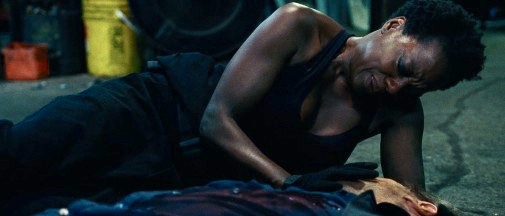
During an epilogue full of reticent emotions, Davis closes the film with an unsure smile. Veronica may be bruised by unimaginable suffering, but she's moving on and the actress shines a light of hope on these final moments of Widows. It's riveting work altogether, but the Best Actress race of 2018 quickly closed itself off to the possibility of surprises. Davis got a BAFTA nomination, but, come Oscar morning, the lineup of five was solidified and no one was very shocked at the outcome. The nominees were Yalitza Aparicio in Roma, Glenn Close in The Wife, Olivia Colman in The Favourite (the winner), Lady Gaga in A Star is Born and Melissa McCarthy in Can You Ever Forgive Me.
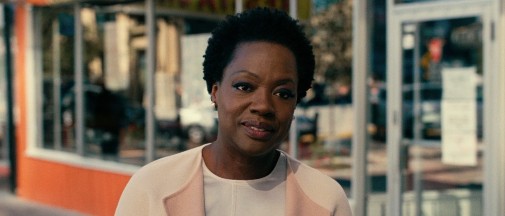
Would you trade any of those women's nominations for a chance to honor Davis' miraculous star turn in Widows?